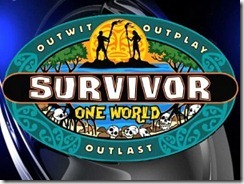A good enemy exploits the weaknesses of his prey. The weaknesses that Mike Breen has identified in the American church are: CELEBRITY, CONSUMERISM and COMPETITION. One sure way to be voted off the island on Survivor—to lose your place on the team—is to turn on someone with whom you have an alliance. Consider how the enemy of competition has made the church turn on our own teammates—and in the process miss the REAL enemy.
COMPETITION
You will never find a more hyper-competitive culture than you do in the United States. As a foreigner living in this land, I can attest to that with the utmost respect. Americans love to win, they love the struggle of the journey and love holding up the gold medal of victory. Now don’t hear me wrong, there’s nothing wrong with being competitive, it’s just how competition has become warped and twisted within our culture. And it’s that, at least in the church, we are competitive about the wrong things.
Much of the American church finds itself competing with the church down the road. “Are we bigger than them? Do we have more influence than them? Do we have the best/biggest youth group in town? Do people like to get married in our church building?
Do people like our church better than theirs?â€
The fact of the matter is that there is a battle, we do have an enemy and we should be competitive…but against our enemy! What we haven’t seen is how crafty he is. This seems to be the alliance he has struck with the American church: “I’ll let a good chunk of your churches grow…just not at the expense of my territory.“
And so what happens?
96% of church growth is due to transfer growth and not churches striking into the heart of our enemy’s territory.
We’ll consider it a win because we have the new service or program that is growing…but that growth is mainly from people coming from other churches. That’s not a win! That’s a staggering loss.
Furthermore, for many pastors, we don’t think we’ve won until we’ve won AND someone else has lost. Seriously?! For sure, we have an enemy and we should be competitive, but we should be competing against our enemy, knowing that the final battle has already been won, and not competing against our own team members.
So gifted and skilled is our enemy, so conniving is he, that he has convinced us that beating the people on our own team is victory while he stands back and laughs, rarely having to ever engage in conflict, protecting his territory. He is beating us with a slight of hand, with a clever distraction, turning us against ourselves.
Question: In what ways are you competing (both in actuality or simply in your mind) against people who are on your own team?
In all honesty, it isn’t that the American church will ever truly die or
cease to exist. It will always be there. But it is entirely possible that if these three critical issues aren’t addressed and dealt with, it will be a hallow shell that is spiritually listless.
If we think through Celebrity, Consumerism and Competition, the anti-body against all of these is sacrifice.
Learning to lay down what builds us up and giving to others instead. “Learning to serve, rather than to be served.†Looking for anonymity rather than celebrity. To build a culture of producers rather than a consumers. To live in a vibrant, sacrificial community fighting a real enemy rather than competing against the same community God has given us to fight WITH rather than AGAINST. It’s about sacrificing what we want for the glory of God and the advancement of his Kingdom, regardless of our advancement or desires.
Clearly this is what Paul was getting after in Philippians 2:6-11 when describing the attitude of Jesus as taking on the attitude of a servant, willing to sacrifice all acclaim and equality with God. It was a willingness to set aside and sacrifice celebrity, consumerism and competition at the altar of the incarnation.
Fifty years ago, as these three subtle threads were being woven into the American church, Dr. Martin Luther King, Jr., serving as a prophetic voice, said this:
If today’s church does not recapture the sacrificial spirit of the early church, it will lose its authenticity, forfeit the loyalty of millions, and be dismissed as an irrelevant social club with no meaning for the twentieth century.
We are now into the second decade of the 21st century and we find ourselves still, for the most part, refusing to sacrifice what we want for what God is asking of us and his Church. Will we have the courage to sacrifice as Christ sacrificed? Will we do the things that cost us so that his Kingdom may advance?
Mike Breen, “Obituary for the American Church,†Verge Network

